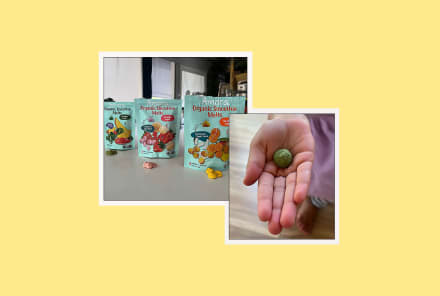Advertisement
How Soon Is Too Soon To Propose? 18 Signs You're Ready + Red Flags To Watch For

Thinking about proposing to your partner, getting engaged, and getting married is an exciting time in any person's life. It means you're in a relationship that is making you truly happy, and you want to make big moves to stay this way. That is seriously wonderful.
At the same time, being very happy in your relationship does not automatically mean you're ready to get engaged. It's important to consider what a proposal really means and whether your relationship is really ready to take that step. To help you think through the decision and timing, we spoke with marriage therapists to get their insights into how soon is too soon to propose, how to know when you're ready to get engaged, and more.
How soon is too soon to propose?
There is no concrete rule for how soon is too soon to propose, according to Elizabeth Earnshaw, LMFT, a licensed marriage therapist and co-founder of the premarital counseling service Ours. However, she points to a 2015 study of 3,000 married couples that found waiting at least a year tends to dramatically increase the odds of a successful marriage.
Couples who date for one to two years before getting engaged are 20% less likely to get divorced than those who get engaged in less than a year, according to the study, and couples who've been together for three or more years before getting engaged are 39% less likely to get divorced.
In general, Earnshaw recommends at least waiting until the so-called honeymoon stage is over before you propose. That's because our brain chemistry in this early phase of a relationship can cloud our ability to make rational decisions. "During this stage, couples are often highly influenced by lots of love hormones," she explains. "These hormones make us more likely to magnify the good and minimize the bad."
The honeymoon phase tends to last anywhere from about three months to a year, she notes, and is typically marked by feelings of infatuation, passion, and intense emotions. "I always suggest couples move out of the honeymoon phase before getting engaged so they are going in with eyes wide-open."
How long do people typically date before getting engaged?
According to a 2018 report by the dating app eHarmony, American couples know each other for an average of five years before getting married—with the exception of millennial couples (i.e., those around ages 25 to 34 at the time of this study), who wait an average of six and a half years.
That lines up with the estimates of licensed marriage therapist Beverley Andre, LMFT, who says it's common for millennial couples to wait about five to six years before getting engaged. But that number "can vary depending on cultural backgrounds, age group, and where people are currently in life," she adds.
Earnshaw offers a shorter time frame—she says people typically date for about two years on average before getting engaged—but she emphasizes that every relationship is different. "I have worked with couples who have gotten engaged within six months and those that have waited much, much longer."
In general, both Andre and Earnshaw note that people today are generally waiting longer to get engaged, in part because many couples move in together prior to marriage these days and feel less pressure to get married as quickly as possible.
9 signs you're ready to propose:
You've talked about marrying each other.
Contrary to popular belief, proposals shouldn't exactly be a "surprise." You might surprise your partner with something special when it comes to the when, where, and how of the proposal, but the fact that you intend to marry this person shouldn't be new information to them. The moment of your proposal also shouldn't be the first time your partner is considering the idea of marrying you. "Don't propose without being clear about what your partner wants in your relationship," Earnshaw warns.
A couple that's truly ready for a proposal has already had conversations where they've both expressed the desire to marry each other and to do so in the near future. There is no ambiguity about what you both want.
You think of your future as a unit, instead of as an individual.
Andre says she can tell a couple is ready for marriage based on the way the individuals think and talk about the future. "Your language changes from 'I/me' to 'we/us/our' when discussing future plans," she explains.
Even when you think of your individual dreams for the future, you envision your partner there with you as part of the full picture. You use terms like "our home," "our kids," and other indicators that you are planning for a joint future, Andre notes.
You know you both want the same things.
To be ready for an engagement, you must have a clear understanding of what type of relationship your partner wants, says Earnshaw. For example, she says, "Do they want marriage? Do they believe in monogamy? Do you both want children?" These are all questions to ask before marriage and make sure you're on the same page about.
You're on the same page about all the big stuff.
On that note, it's important to make sure you and your partner are aligned on big-picture values and lifestyle preferences prior to a proposal. You know you're ready to propose when you've already had deep conversations about the following topics, you know where you both stand, and you align on the things that matter most to you both:
- Whether you want kids
- Finances, including spending styles, saving habits, goals, and how you intend to approach shared expenses as a couple
- Religion and what role it'll play in your life (and any future children's lives)
- Politics and values
- Where to live
- How you'll manage shared household responsibilities
- Lifestyle factors (Do you go out on the weekends or stay in? Do you drink regularly or practice sober living? How do you each approach health and well-being?)
You like how they treat people—not just how they treat you.
Another thing you'll want to make sure you've done before proposing? "You've taken time to observe how your significant other interacts with people beyond your relationship–for example, how they treat their friends, family, and even strangers," Earnshaw says.
Your partner might be extremely loving and considerate to you right now, but how do they treat the other people in their life? A few years from now, when the highs of early romance have worn off and you're deep into the simultaneously stressful and dull minutiae of everyday life, the way they treat you will likely look pretty similar to the way they treat most people in their social orbits.
You've experienced making decisions together.
You're ready to propose when you have experienced making decisions—big and small—as a couple, says Earnshaw. "You've been able to make decisions together and have been able to take each other's influence."
If you know for a fact that the two of you generally approach disagreements well, and you have had many experiences of the two of you negotiating peacefully, that's a good sign that your relationship has a strong foundation for marriage.
Your conflicts rarely get nasty.
Every couple will have conflicts from time to time, but what matters is how you handle those conflicts. "You have been able to navigate differences with respect," Earnshaw says. "However, if you find that your arguments [tend to] become disrespectful and hurtful, you should take more time before taking the next step. Being engaged won't make your communication better."
You're ready to propose when you know with confidence that you can both navigate those moments in consistently healthy ways, based on the way your previous conflicts have gone. Your arguments rarely turn nasty, and if they have in the past, you have taken ample time to learn how to minimize those harmful behaviors.
You're starting to think about married life.
On an emotional level, one sign that you're ready to propose is when you find yourself starting to envision married life with this person. "[Your] actions start to align with proposing," says Andre. "You find yourself thinking about how you would propose, what ring styles to consider, what the wedding would look like, and things you look forward to when married."
You're open to premarital counseling.
Premarital counseling is a way for couples to get some of the big questions and discussions out of the way before you actually get married, so that you both know exactly what and who you're committing to, and so you are moving forward with all the knowledge, relational skills, and confidence you need as you head into marriage.
"Find out before you propose if your partner would be willing to set your relationship up for success with premarital counseling," Earnshaw recommends. This conversation can also itself be illuminating, as it can reveal how you both think about the idea of personal growth and spending intentional time on your relationship—necessary ingredients for a successful marriage.
9 signs it might be too soon:
You've known each other for less than a year.
This isn't a hard-and-fast rule—some couples do get engaged a few months after knowing each other and go on to have long, happy marriages. However, it's important to recognize that this is, almost without question, taking a risk. The risk may pay off and work out in the end, but it also may not. And research does suggest that couples who date for a longer time before they get married tend to have a happier marriage.
That's because a few months of knowing each other often doesn't give a couple enough time to experience the full breadth of life events together. As Earnshaw points out, the first year of a relationship is typically filled with a lot of highs, and it's not necessarily representative of what daily life will be like together once the highs wear off. It's helpful to have a few repetitions of good, bad, boring, and chaotic periods together as a couple before you commit to a forever together, so you have a sense of the flow of your relationship that you can expect to cycle through for the rest of your life.
Your relationship is highly passionate.
Many people make the mistake of getting married when the passion is at a peak. You feel so excited to have found each other and to have such an intense, deep connection to each other, and you're convinced this person is perfect for you in every way. You may feel so in love with each other that you just want to merge completely, which is part of where the urge to get engaged quickly may come from.
The thing is, these intense feelings are a marker that you're likely in the first stage of a relationship, and this time of heightened emotions is often not a wise time to be making big life decisions. "These emotions often drown out the rational part of our brain," licensed marriage therapist Linda Carroll, LMFT, writes at mbg. "Research tells us this first stage is marked by biochemical changes in our brain—a cocktail of hormones that trigger and maintain a state of infatuation, such as dopamine, oxytocin, and endorphins. This brain glow can often lead us to become 'addicted' to our partners and to ignore incompatibilities, red flags, or other issues."
Earnshaw recommends waiting until this "honeymoon stage" is over before you get engaged—at least a year, to be safe. Think of it like this: If passion is at a peak right now, you'll want to know what your relationship feels like on the other side of that peak and make sure an engagement still feels right even when your hormones aren't raging.
You haven't met the important people in their life.
"If you haven't met their family, friends, and other essential members of their life, it's too early," says Andre. It's too soon to propose when you don't know much about the people closest to your partner, as those people say a lot about who your partner is and how they approach the important relationship in their lives.
You're not sure about their values.
It's also too soon to propose if you still haven't had major conversations about each other's values, especially when it comes to things like commitment, sex, family values, religion, politics, money, and attitudes around work. "Having a good sense of who and what is important to your partner is foundational," says Andre.
The last thing you want is to be years into a marriage when you realize that you're incompatible when it comes to (for example) your parenting styles, spending habits, or expectations for sex in a marriage.
You're still not that familiar with the details of their life outside of you.
According to Earnshaw, another major sign that it's too soon to propose is you don't know that much about their life outside of you and your relationship. Do you know their career and life aspirations? What they do for work and how they spend their free time? Who are the people they spend time with and talk to regularly? You should not only know the answers to these questions but also have intimate familiarity with all these aspects of your partner's life.
You're more excited about the idea of getting married than about your actual relationship.
Are you excited to marry your partner, or are you just excited to get married? Are you looking forward to spending all your days for the rest of your life with this person until you're old and wrinkly, or are you just looking forward to "locking in" the attractive person you see in front of you? Is your decision to get married about wanting to make a commitment to your partner, or is it about impressing your friends and family?
"If your reasons are superficial and selfish, it may be too early to propose," says Andre. "If you can only think of things that person does for you, or aesthetic reasons, you might want to wait until you can identify shared values and character traits that your future partner shares."
You sometimes have arguments that turn ugly.
Another clear sign that it's too soon to get engaged: You have yet to figure out how to navigate conflict with respect, says Earnshaw. "If you haven't built the skills for conflict management yet, then engagement won't change that. Slow down and take time to learn how to better navigate differences together."
You have never argued at all yet.
On the flip side, if you and your partner have yet to experience a major conflict at all, it may also be a good idea to pump the breaks until you have a few of those under your belt. You both need to see how the other person approaches disagreements and make sure that you're both able to move through those difficult moments in healthy ways.
Additionally, if you have yet to disagree with each other on anything, that may signal that you have not yet had enough daily, intimate experiences with one another yet (because if you're together enough through the day-to-day and week-to-week slog of routine life, some disagreements are bound to happen).
Or, it could mean that one or both of you is not yet comfortable being fully honest and authentic in the relationship yet—another sign that it's much too soon to be thinking about a proposal.
You're not sure how your partner feels about marrying you yet.
If you aren't 100% certain that your partner wants to marry you, it's too soon to propose. You should know that you and your partner are on the same page before you propose, says Earnshaw. A proposal shouldn't be used to save a relationship that's on the rocks, nor should it be used to pressure a partner into a commitment they're not yet ready for or sure about.
"While I would hope it goes without saying, in reality it doesn't," says Earnshaw. "Many people propose in hopes it will strengthen a faltering or noncommittal relationship. Only propose to someone who has an equal level of excitement and commitment to your relationship."
The takeaway.
A proposal is more than just a big gesture or a milestone to check off your list. A proposal represents a commitment—a commitment to share life with this person, day after day, through the stresses and boredom of daily life, long after the high of saying yes and then saying "I do" passes. It's a commitment to supporting their dreams and well-being with the same gusto that you put into your own and tying your future to theirs. It's important to go into this decision with clear eyes, a lot of shared experiences under your belt as a couple, and much clarity and conversation before anyone ever actually gets down on one knee.
Watch Next
Enjoy some of our favorite clips from classes
Enjoy some of our favorite clips from classes
What Is Meditation?
Mindfulness/Spirituality | Light Watkins
Box Breathing
Mindfulness/Spirituality | Gwen Dittmar
What Breathwork Can Address
Mindfulness/Spirituality | Gwen Dittmar
The 8 Limbs of Yoga - What is Asana?
Yoga | Caley Alyssa
Two Standing Postures to Open Up Tight Hips
Yoga | Caley Alyssa
How Plants Can Optimize Athletic Performance
Nutrition | Rich Roll
What to Eat Before a Workout
Nutrition | Rich Roll
How Ayurveda Helps Us Navigate Modern Life
Nutrition | Sahara Rose
Messages About Love & Relationships
Love & Relationships | Esther Perel
Love Languages
Love & Relationships | Esther Perel
What Is Meditation?
Box Breathing
What Breathwork Can Address
The 8 Limbs of Yoga - What is Asana?
Two Standing Postures to Open Up Tight Hips
How Plants Can Optimize Athletic Performance
What to Eat Before a Workout
How Ayurveda Helps Us Navigate Modern Life
Messages About Love & Relationships
Love Languages
Advertisement

I'm A Couples' Counselor & This Is The No. 1 Activity For A Lasting Relationship
Rachel Glik, Ed.D., LPC

I'm A Couples' Counselor & This Is The No. 1 Activity For A Lasting Relationship
Rachel Glik, Ed.D., LPC









